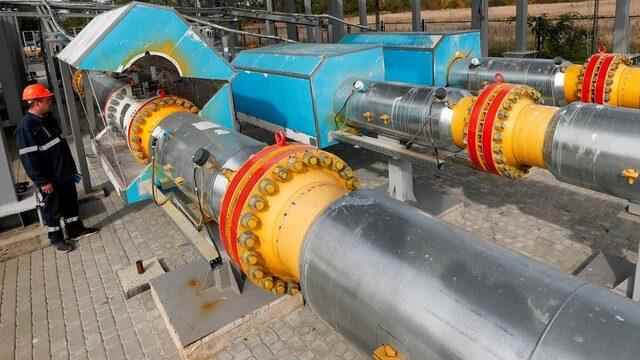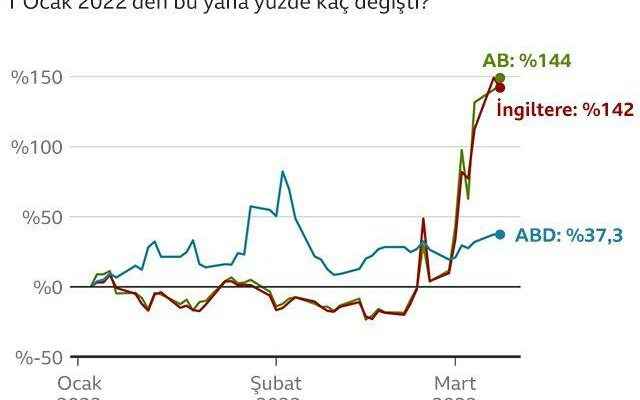The European Union (EU) plans to stop all oil imports from Russia by the end of the year. However, member states have not yet reached an agreement on natural gas.
As of April 1, Russian President Vladimir Putin signed the decree stipulating that the gas agreement parties make their payments in rubles and said that the agreements of those who do not comply with this condition will be stopped.
Germany, France and the UK announced that they would not comply with this request, and other EU member states agreed with this decision.
Then, last week, Russia stopped natural gas flows to Poland and Bulgaria, which refused to pay in rubles.
What sanctions are there on Russian oil and gas?
The United States has announced that it has completely banned oil, gas and coal imports from Russia after Ukraine called for an expansion of sanctions.
The UK will phase out imports of Russian oil by the end of the year, and the EU will cut gas imports by two-thirds.
UK officials say this provides ample time to find supply alternatives.
EU Commission President Ursula von der Leyen announced that the union’s dependence on Russian oil has ended, and that this process will be completed by the end of the year.
It is reported that EU members Hungary and Slovakia may continue to purchase crude oil from Russia until the end of 2023, under their ongoing agreements.
Russian Deputy Prime Minister Aleksander Novak said rejecting Russian oil would have “disastrous consequences for the global market”.
Oil and gas prices have already risen sharply. It could go even higher if Russia stops exports altogether.
Despite the sanctions, Russia has nearly doubled its profits from fuels it sells to Europe, according to the Center for Energy and Clean Air Research (CRECA).
The increase in oil prices does not only affect gasoline prices, it can cause global commodity prices to rise even more and lower living standards.
Since the beginning of the war, the EU has purchased $23 billion a month of fossil fuels from Russia. In 2021, it was paying an average of 12.5 billion dollars per month.
How much oil does Russia export?
Russia is the world’s third largest oil producer after the United States and Saudi Arabia.
More than half of the roughly five million barrels of crude oil Russia exports every day goes to Europe.
Russian imports account for 8 percent of total UK oil demand.
The USA, which supplies about 3 percent of its oil supply from Russia in 2020, is less dependent on the country.
What are alternative oil sources?
Energy Policy Studies Analyst Ben McWilliams says it should be easier to find alternative oil suppliers than gas:
“Because there aren’t a lot of pipelines. Some come from Russia, but there’s a lot of shipments from other places as well.”
The US wants Saudi Arabia to increase its oil production. However, the country had previously turned down US demands to increase production in order to lower oil prices.
Saudi Arabia is the largest producer of the oil cartel OPEC, which produces about 60 percent of the crude oil traded internationally. Therefore, OPEC has a key role in determining oil prices.
Russia is not a member of OPEC, but has been working with the organization since 2017. Countries can impose limits on oil production in order to profit producers.
The US is also considering easing Venezuela’s oil sanctions. The country used to be a major oil supplier to the US, but recently Venezuela has been selling most of its oil to China.
What if the flow of Russian gas to Western Europe stops?
Despite the occupation of Ukraine, EU member states continue to supply large amounts of natural gas from Russia. Russian gas accounts for about 40 percent of the EU’s natural gas imports.
However, after the West’s announcement of sanctions, Russia announced that “unfriendly” countries would have to buy gas in exchange for rubles.
Last week, Russian Energy Company Gazprom cut off gas flow to Poland and Bulgaria, and said that if the payment is not made in rubles, the delivery will not start again. This situation was evaluated as “blackmail” by the EU.
If the payment is not made in rubles, the cut is expected to be applied to other EU countries in mid-May.
Who pays in rubles?
Von der Leyen said that complying with Russia’s wishes would harm the financial sanctions imposed by the EU and the companies that do so.
EU member states do not agree on when their energy dependence on Russia will end.
Gas companies in some European countries such as Germany, Slovakia and Hungary have agreed to pay the Russian bank Gazprombank in euros to be converted into rubles.
Gas companies in Austria and Italy are also planning to open accounts at Gazprombank to follow the same path, Financial Times reported.
Can an alternative to Russian gas be found?
It is not easy to find an alternative to Russian gas.
Europe may turn to Qatar or existing gas exporters such as Algeria and Nigeria, but for these countries there are practical barriers to rapidly ramping up production.
“It’s more difficult to change the source of gas imports because we have big pipes that carry Russian gas to Europe,” says Ben McWilliams.
Economic think tank Bruegel predicts that if Russia stops gas supplies to Europe, Europe could import more liquefied natural gas (LNG) from the US.

Cutting off the gas supply could also accelerate the use of renewable energy sources, but doing so is not quick or easy.
“Renewables take time to become available, so it’s not a solution in the short term,” says Research Analyst Simone Tagliapietra.
“So fuel changes like the opening of coal-fired power plants for the coming winter could make the difference. That’s between Italy and Germany’s contingency plans.”
The EU has proposed a plan to end Europe’s dependence on Russian fossil fuels before 2030. This plan includes diversification of gas sources and measures to replace gas in heating and electricity generation.
UK energy bills could rise
Russia provides only 5 percent of the UK’s gas supply, and the US does not import gas from Russia.
However, prices in the UK and the US are still rising significantly due to the knock-on effect of the shortage of supplies.
Due to the war, consumers’ natural gas bills will also increase.
In the UK, household gas bills are controlled by a set ceiling price.
But when the ceiling is raised in April, annual bills will increase by £700 to around £2,000. Bills are expected to rise to £3,000 when the cap is raised again this fall.
Gasoline and diesel prices also rose in the UK. Gasoline is expected to rise to £1.75 per liter as the war continues.

In the US, where the American Automobile Association announced that pump prices rose 11 percent last week, oil prices reached the highest level since 2008.
“I think if we’re in a world where the flow of Russian oil and gas to Europe has stopped, then we’re going to need measures like rationing,” McWilliams says.
“One of the hot topics right now is telling households to turn their thermostats down one degree. This could save a lot of gas.”
